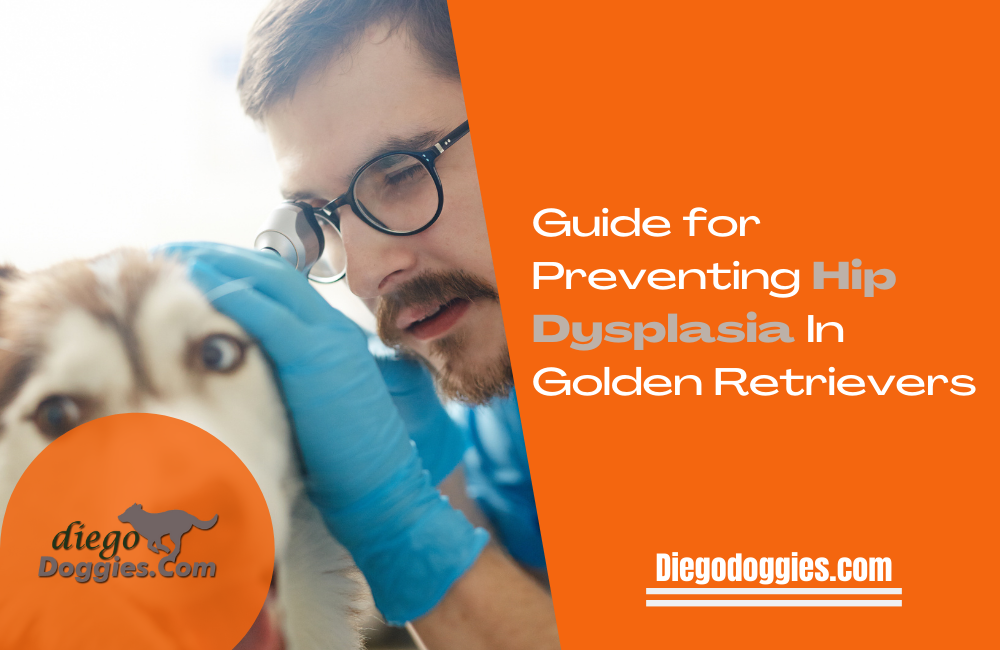Hip dysplasia is a condition that affects the hip joint of dogs and can eventually lead to arthritis and pain. Golden retrievers are especially prone to this condition. Yet, golden retrievers are one of the most popular dog breeds. A study has shown that up to 50% of all golden retrievers in a test sample showed hip dysplasia. You can read the study by clicking here.
The symptoms of hip dysplasia include limping, stiffness, and difficulty rising from a lying down position. Hip dysplasia is caused by a combination of genetic and environmental factors. To prevent hip dysplasia, it is important to start with a good diet. This type of diet will help to keep the joints healthy and prevent the symptoms of hip dysplasia from developing.
1. Introduction To The Topic Of Hip Dysplasia In Golden Retrievers
It occurs when the hip joint does not fit together properly, resulting in pain and stiffness. Hip dysplasia is a hereditary condition, and it is thought to be caused by a combination of environmental and genetic factors.
There is no cure for hip dysplasia, but there are treatments that can help to improve the quality of life for affected dogs. If you think your golden retriever may be showing signs of hip dysplasia, please consult your veterinarian.
2. Description Of The Symptoms Of Hip Dysplasia
Hip dysplasia is a condition that can affect dogs of all breeds, but it is especially common in golden retrievers. The symptoms of hip dysplasia can vary from mild to severe, and they may include lameness, stiffness, pain, and inflammation. In some cases, the condition can lead to arthritis.
If you suspect that your dog has hip dysplasia, it is important to take your dog to the vet for an evaluation. Diagnosing hip dysplasia early is important for managing the condition and preventing further damage to the hip joint. With proper treatment, many dogs with hip dysplasia can live happy and healthy lives.
3. The Causes Of Hip Dysplasia
Hip dysplasia is a common condition in golden retrievers that can cause pain and mobility problems. There are several factors that can contribute to the development of hip dysplasia, including genetics, weight, and diet. While there is no single cause of hip dysplasia, studies have shown that certain genetic factors can increase a dog’s risk of developing the condition.
Additionally, overweight or obese dogs are more likely to develop hip dysplasia, as excess weight puts additional strain on the joints. Lastly, diet can also play a role in the development of hip dysplasia; for example, diets high in calcium have been linked to an increased risk of hip dysplasia.
An authoritative article stated, “Known nutritional risk factors are rapid weight gain and excessive calcium supplementation.” In other words, giving your golden retriever excessive calcium whether by supplements or bones is not a good idea. The report can be read by clicking here.
4. Tips For Preventing Hip Dysplasia
This is a condition where the hip socket does not form properly, leading to pain, lameness, and eventually arthritis. While there is no guaranteed way to prevent hip dysplasia, there are some steps that can be taken to reduce the risk.
First, make sure your dog gets plenty of exercises. This will help to keep the muscles around the hip joint strong and healthy. Second, provide a balanced diet that includes all the vet-approved essential nutrients. This will help to ensure that your dog grows at a healthy rate and does not put too much strain on the joints.
5. The Best Diet For Preventing Hip Dysplasia In Golden Retrievers
There are certain dietary changes that can help. For example, increasing the amount of omega-3 fatty acids in the diet can help to reduce inflammation and support joint health. Adding glucosamine and chondroitin supplements can also be beneficial. It is important that the diet for your Golden retriever is right, and you should seek expert advice shortly after bringing your golden retriever puppy home.
The article “A Vet Talks About the Best Ingredients for Joint Supplements for Dogs” by Dr. Sarah Wooten DVM makes that clear. Excessive calcium is a danger to your golden retriever. You can read Sarah’s article by clicking here.
Golden retrievers are also prone to obesity, so it is important to ensure that they are getting enough exercise and eating a balanced diet. By making some simple changes, you can help to keep your golden retriever healthy and prevent hip dysplasia.
6. Summary Of The Key Points About Hip Dysplasia Prevention In Golden Retrievers
Although hip dysplasia is a condition that commonly affects the hip joints of golden retrievers caring owners can be effective by getting professional diet advice early in the dog’s life. A trip to the dog park or daily walks helps make sure that your dog gets plenty of exercises.
This will help to keep the muscles around the hip joint strong and prevent the joint from becoming unstable. Second, owners should feed their dogs a balanced diet that includes all the necessary nutrients for healthy joint development. Third, owners should avoid giving their dogs any type of steroids, as these can increase the risks to their health.
Conclusion
There is no one-size-fits-all solution for preventing hip dysplasia in golden retrievers, but there are clearly some things that owners can do to reduce the risk. Firstly, get professional advice regarding your dog’s diet when you first bring your puppy home. Secondly, make sure your dog gets plenty of exercises.
This will help to keep the muscles around the hip joint strong and healthy. This will help to ensure that your dog grows at a healthy rate and does not put too much strain on the joints. Initially, work with a reputable breeder to choose a puppy with good hip conformation. By taking these steps, you can help to reduce the risk of hip dysplasia in your golden retriever.
Related Content
- Alga Norte Dog Park with Training Obstacles & Nice Off-Leash Areas
- Coronado Dog Beach near San Diego Offers Great Point Loma Views
- Del Mar Dog Beach with Spectacular Cliff Views
- Dusty Rhodes Dog Park in San Diego near Ocean Beach
- Fiesta Island Dog Beach Off-Leash Dog Park at Mission Bay
- Grape Street Dog Park in Balboa Park Brings Nature to the City
- Morley Field Off-Leash Dog Park in Balboa Park – Amazing Canyon Views
- Nate’s Point Off-Leash Dog Park at Balboa Park
- Ocean Beach Off-Leash Dog Beach in San Diego, CA
- Rancho Bernardo Off-Leash Dog Park in San Diego, CA
- Dog Grooming – Tips And Tools
- How To Clean A Dog’s Clothes, Sweaters, Bedding & Collars
- 10 Best Park Accessories for Dog Owners
- Is Your Dog Barking Excessively And Annoying Your Neighbours?
- Dog Grooming Take- Diego Doggies
- Restrain a Dog for Grooming: The Safe and Easy Way
- Start a Dog Grooming Business
- Adopt a Dog in San Diego: Everything You Need to Know
- Dog Training Cost? A Comprehensive Guide
- Right Dog Raincoat: The Ultimate Guide
- San Diego Dog Park Safety Tips, Training, and Dog Accessories
- What You Should Do To Become a Responsible Dog Owner
- 7 Benefits of Dog Grooming and Exercising in San Diego
References:
Estimates of the prevalence of hip dysplasia in Golden Retrievers and Rottweilers and the influence of bias on published prevalence figures: https://pubmed.ncbi.nlm.nih.gov/15702688/
A Vet Talks About the Best Ingredients for Joint Supplements for Dogs:


2 thoughts on “Guide For Preventing Hip Dysplasia In Golden Retrievers”